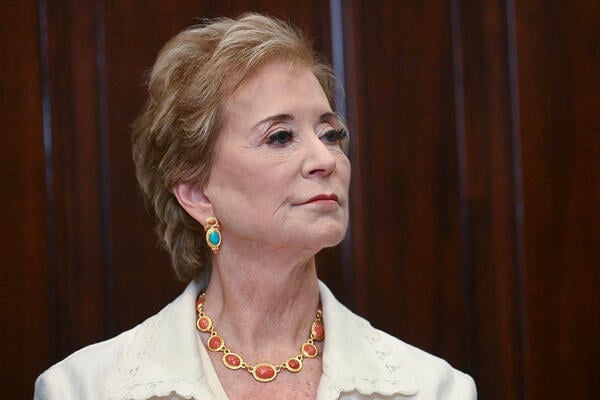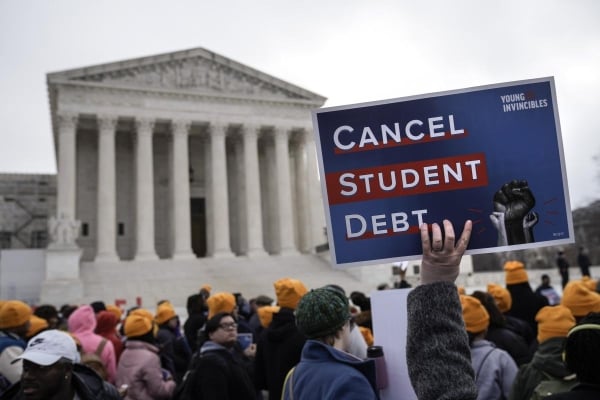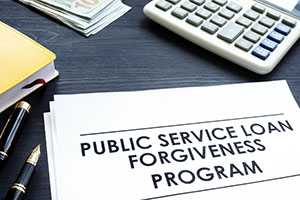Employees at any company the Trump administration deems as having “a substantial illegal purpose” will no longer qualify for Public Service Loan Forgiveness under a new set of regulations finalized Thursday by the Department of Education.
The final rule is very similar to the first draft released in August—both of which have been heavily criticized. The policy change, in the works for months, stemmed from an executive order issued in March. Lawsuits challenging the new rule, which takes effect July 1 of next year, are expected as soon as next week.
“My first reaction when reading the rule was that we will see them in court,” said Brian Galle, a law professor at the University of California, Berkeley, who submitted a comment along with at least a dozen other scholars of tax law.
Collectively, the commenters called on department officials to conduct an extensive review and study over the rule, none of which were completed. So now, Galle said, the department will face the consequences.
“I know that firsthand,” he explained. “A rule that I wrote for the Securities and Exchange Commission was sent back by the Fifth Circuit because there was one statistical study that the agency didn’t do.”
Under the new rule, illegal activities will include: aiding and abetting violations of immigration or civil rights law, supporting terrorism, providing gender-affirming care, or “trafficking” children from one state to another for purposes of emancipation. The education secretary will decide whether an employer violates the rule based on a “preponderance of the evidence.”
Many Democrats, industry leaders and student borrower advocates who have spoken out against the rule say it is vague and could allow Trump and future presidents to abuse executive power, essentially choosing which organizations qualify based on ideological preferences.
Rep. Bobby Scott, a Virginia Democrat and ranking member of the House Education and Workforce Committee, told Inside Higher Ed that the rule “opens the door for all kinds of mischief.”
“If you’re on the Trump side of the partisan political agenda on an issue, you get loan forgiveness. If you’re on the other side of the controversy, you don’t,” he explained. “A group promoting civil rights may be in jeopardy.”
The National Council of Nonprofits went as far as declaring the new rule “unlawful” and saying it sets “a troubling precedent.”
“Federal law makes clear that eligibility under PSLF applies to all charitable nonprofit organizations,” the organization wrote. “The Education Department does not have the authority to change eligibility. By unlawfully excluding certain nonprofits, the final rule opens the door to government overreach and abuse.”
The Trump administration and fellow Republicans, however, say it has nothing to do with partisan politics and instead is focused on terminating unlawful actions that by their “very nature run contrary to the public good.”
“As the name suggests, Public Service Loan Forgiveness was intended to help meet workforce needs for employers who serve the public good. Unfortunately, the open-ended nature of PSLF has forced taxpayers—many of whom never went to college, to foot the bill for employees at radical organizations that violate state and federal laws,” Rep. Tim Walberg, a Michigan Republican and chair of the Education and Workforce Committee, said in his statement about the rule.
Education Under Secretary Nicholas Kent also chimed in, saying in a statement that “the Trump Administration is refocusing the PSLF program to ensure federal benefits go to our nation’s teachers, first responders, and civil servants who tirelessly serve their communities.”
In addition to defining what activities are illegal, the rule outlines types of evidence that the secretary may consider in the decision process, establishes an appeals process and states that the department must provide “prompt notification” to both borrowers and employers when their eligibility is at risk. It also notes that, in general, employers with “minor compliance issues” and “no concerted practice of illegal activity” will be safe.
The department estimates that fewer than 10 employers will be affected each year. But critics say that estimate is based on little research and worry the effect will be much broader.
The National Council of Nonprofits said ultimately the rule could harm millions, as countless communities depend on their local nonprofits. By putting the nonprofit workforce at risk, they added, the rule jeopardizes nonprofits’ ability to meet those needs and provide essential services.
A collection of half a dozen physicians’ groups echoed that point, arguing that if hospitals and the medical professionals they employ lose access to PSLF, it could jeopardize both physicians’ financial stability and patients’ access to care.
“PSLF is not just a loan program; it is a lifeline that allows medical graduates to choose primary care or psychiatry careers in high-need areas without being weighed down by insurmountable debt,” the group wrote in a news release. “We strongly urge the Department of Education to preserve physicians’ access to the PSLF program and recognize that a healthy America depends on a strong physician workforce.”
Galle from Berkeley believes that this lack of awareness regarding the scope of impact will become evident in court. He said that such a lack of evaluation, along with what he sees as the department’s executive overreach in issuing the rule, will give any plaintiffs a strong case in court.
“The Supreme Court in the last eight years has really been at pains to say that Congress doesn’t give agencies … the authority to be way outside their lane,” he said. “And you couldn’t possibly be further outside your lane and your expertise than ED is with this rule.”
Shortly after the department announced the final rule, multiple legal groups said they intend to sue over it.
Democracy Forward, which has led a number of lawsuits against the Trump administration this year, and Protect Borrowers, a student loan advocacy group, described the new policy as “a craven attempt to usurp the legislature’s authority in an unconstitutional power grab.”
Student Defense, a policy, litigation and advocacy organization, accused the president of “playing political football with the financial well-being of people who have dedicated their lives to public service.”
All three said a lawsuit can be expected in a matter of days.
“Congress created the Public Service Loan Forgiveness program because it is important for our democracy that we support the people who do the hard work to serve our communities,” Democracy Forward wrote in its release. “In our democracy, the president does not have the authority to overrule Congress.”
Galle said the key question in the legal fight will be whether the Supreme Court will enforce those checks and balances.
“Under any judge or justice who was applying the law as it is today, I don’t think this rule would have any hope of being upheld,” he said. “The only room for doubt is that it seems like the Supreme Court is willing to ignore most of what current law is.”




